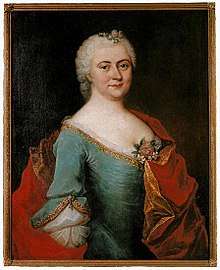Luise Gottsched
Luise Adelgunde Victorie Gottsched (born Kulmus, 11 April 1713 – 26 June 1762) was a German poet, playwright, essayist, and translator,[1] and is often considered one of the founders of modern German theatrical comedy.[2]
Luise Gottsched | |
|---|---|
 | |
| Born | 11 April 1713 Danzig |
| Died | 26 June 1762 (aged 49) Leipzig |
| Nationality | German |
| Spouse | Johann Christoph Gottsched |
Biography
She was born in Danzig (Gdańsk), Royal Prussia (Crown of Poland). During her lifetime, she was considered one of Europe's leading intellects and one of the most intelligent women of the time.
She became acquainted with her husband, the poet and author Johann Christoph Gottsched, when she sent him some of her own works. He apparently was impressed, and a long correspondence eventually led to marriage. After marriage, Luise continued to write and publish[3], and was also her husband's faithful helper in his literary labours.[4]
Her uncle was the anatomist Johann Adam Kulmus.
Works
She wrote several popular comedies, of which Das Testament is the best, and translated The Spectator (9 volumes, 1739–1743), Alexander Pope's Rape of the Lock (1744) and other English and French works. After her death her husband edited her Sämtliche kleinere Gedichte with a memoir (1763).[5]
References
- Hilary Brown, Luise Gottsched the Translator (Camden House, 2012, ISBN 9781571135100)
- Becker-Cantarino, Barbara (2005-01-01). German Literature of the Eighteenth Century: The Enlightenment and Sensibility. Boydell & Brewer. ISBN 9781571132468.
- "Luise K. Gottsched: A biography". Brown University. Retrieved 14 August 2018.
-

-

Sources
- Gilman, D. C.; Peck, H. T.; Colby, F. M., eds. (1905). . New International Encyclopedia (1st ed.). New York: Dodd, Mead.